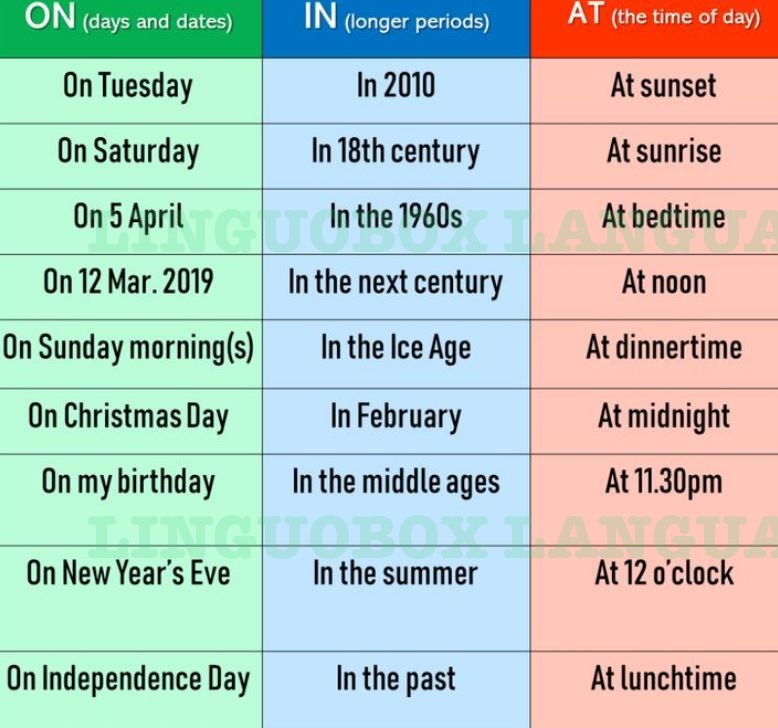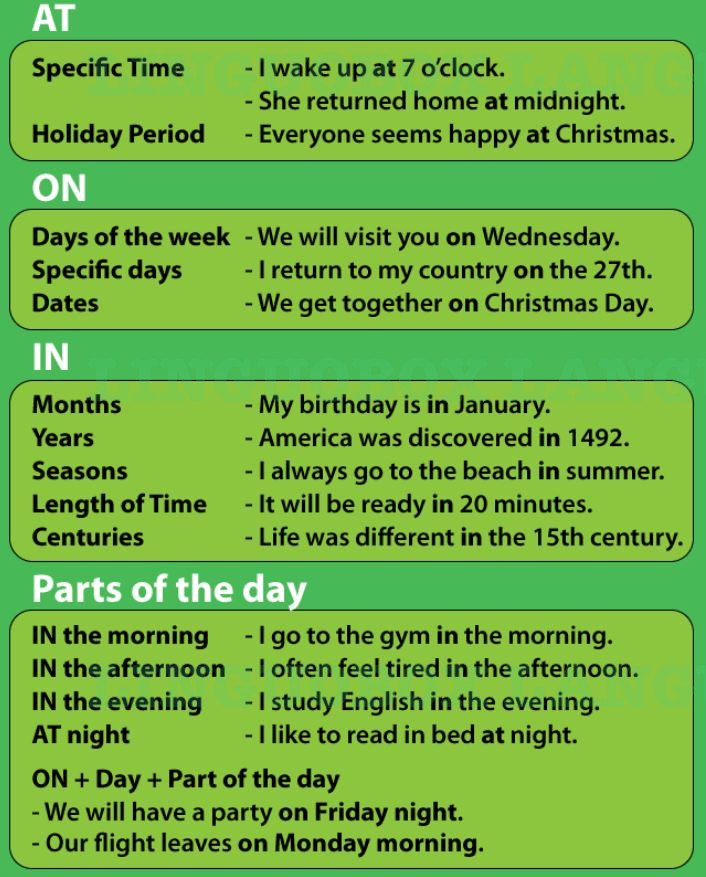حروف اضافه مربوط به زمان


حروف اضافه مربوط به زمان
How To
Better Use IN, ON, AT – Useful Prepositions Of Time
Do you have a hard time about when to use IN, ON, AT, and all the other
prepositions of time? Then you’re in the right place! In
this article, you will learn how to use them properly, from the basics to more
advanced cases. Quick reminder! Becoming an effective communicator is not only
about having spotless grammar. However, knowing the difference between IN, ON,
AT, or knowing whether to use TO
or FOR, might indeed help you become more confident.
Prepositions
of time IN, ON, AT (the basics)
For now, let’s focus on when to use IN, ON, and AT. The
preposition IN is generally used for longer periods of time (centuries, years, and months), ON is used for days, and AT is used for more specific moments, such the time.
Here are some examples:
1. We agreed to think it over IN the winter.
2. We can make the final decision IN January.
3. The last time they wanted to relocate was IN 2011.
4. A meeting ON Tuesday, Wednesday, or Thursday would
be OK.
5. ON Mondays and Fridays most people work from home.
6. Can you call back later? I’m busy AT the moment.
7. This tool was invented IN the 20th century.
8. We’re leaving ON December 6th.
9. We usually have lunch AT 1 pm.
10. I prefer to go to the beach IN June.
Now it’s your turn to practice!
Complete the following sentences with IN, ON, or AT:
1. The meeting is going to start ___ 9:00 ___ the
morning.
2. Our anniversary is ___ October 17.
3. We can chat ___ lunchtime.
4. I always end up working from home ___ the
evening.
5. I was born ___ 1979.
6. We usually have a business trip ___ spring.
7. ___ Mondays we try not to schedule any meetings.
8. We met ___ a cold and snowy day in London.
9. The event is ___ 3:30 ___ the
afternoon – Shall we walk there together?
10. He called me ___ midnight! Can you believe it?
Time
expressions without IN, ON, AT
Do not use IN, ON, or AT in the following situations:
With LAST and NEXT:
1. We have a meeting next Monday.
2. Next year we will go to the USA.
3. We started this project last month.
4. I saw him last Friday.
With THIS and EVERY:
1. There was a big traffic
jam this morning.
2. This month has been very intense.
3. Every evening I try to work out.
4. I drive to work every day.
5. We have a cool event this weekend.
Other time expressions that do
not require preposition:
1. Yesterday
2. Soon
3. Right now
4. A long time ago
5. An hour ago
6. One month ago
7. Today
8. Today
9. Tomorrow morning
10. Tomorrow
11. Yesterday afternoon
Now it’s your turn to practice!
Complete the following sentences with IN, ON, AT, or X if no preposition is
needed:
1. I spoke to the CTO ___ last Monday.
2. We are leaving ___ 8:30.
3. I met the new recruiter ___ yesterday morning.
4. Did you receive the email I sent you ___ August
4th?
5. Are you giving a presentation ___ next month?
6. I’ll probably be super busy ___ September.
7. ___ last week I worked until 10 pm ___ every
night.
8. I hate waking up early ___ the morning.
9. ___ today we need to find a better way to do it.
10. The company was founded ___ 2011.
11. The company was founded ___ March ___ 9
years ago.
12. My father was born ___ the 60s.
13. I found out about it ___ yesterday.
Advanced
– Other prepositions of time
Apart from IN, ON, and AT, there are also other prepositions to
express time:
From… to… Use this expression to express the beginning and end of a period.
1. I work from 9 to 5.
2. I’ll be in England from Monday to Friday.
For. Use “for” + a period of time to express the duration of an action:
1. I’ve been working here for 8 months.
2. I’ve lived in this house for 10 years.
Since. Use “since” + a starting point / a specific time to show when
something started:
1. I have worked here since 2018.
2. They have been in the conference room since 10 am.
During. We use “during” + a noun to say when something happens:
1. We met a lot of interesting people during the trip.
2. He fell asleep during the talk.
Until. Use “until” to say when
a situation ends. Here, we refer to the period before a deadline. “Until” is
used to describe a state or situation in a period up to a particular moment.
1. I’ll be in Korea until Friday.
2. I worked until 11 pm yesterday!
3. Let’s wait until they arrive.
By. Use “by” when we refer to a deadline. “By” is used to describe an
action or event that happens on or before a particular moment.
1. We need to submit the invoice by the end of March.
2. I can do it by 5 pm.
Still not sure about the
difference between UNTIL and BY? Compare:
1. “I can do it by 4 pm” → At 4 pm it will be finished
2. “I can’t do it until 4 pm” → I can’t start before 4 pm.
I’ll start at 4 pm.
3. “I can’t do it by 4 pm” → I won’t be able to finish before
that time
4. “I can do it until 4 pm” → I will work from now to 4 pm,
and then I’ll stop, even if I haven’t finished.
One more exercise before we
wrap up! Fill in the blanks with IN, ON, AT, FOR, UNTIL, BY, SINCE, FROM,
DURING, or X if no preposition is needed:
1. We are leaving ___ Tuesday ___ the
afternoon.
2. I always go running ___ Sundays.
3. Please send me all the info ___ Thursday
afternoon.
4. I nearly fell asleep ___ the meeting.
5. We didn’t do anything ___ Thursday ___ Monday.
6. I’ll be in New York ___ a week.
7. I’ll give you all the details ___ the end of
the week.
8. She’s been the manager ___ 10 years.
9. Let’s wait ___ everyone is here.
10. They said they would arrive ___ noon, but it’s ___
2 pm and we’ve been waiting ___ 11 am and no one has
come.
